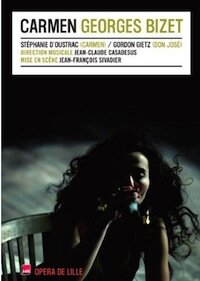
Stéphanie d'Oustrac
22-24-27-30 October 2013 - 19h30 /
3 November - 14h30 /
5-8-11-13 November 2013 - 19h30
Opéra National de Paris
Dorabella in Cosi Fan Tutte /
W.A. Mozart
3 November - 14h30 /
5-8-11-13 November 2013 - 19h30
Opéra National de Paris
Dorabella in Cosi Fan Tutte /
W.A. Mozart
See diary
As a little girl Stéphanie d'Oustrac, the great-niece of Francis Poulenc and great-great-niece of Jacques de la Presle (Prix de Rome composition), used to sing in secret for her own pleasure. Subsequent years with the Maîtrise de Bretagne children's choir, under conductor of Jean-Michel Noël, had a profound influence on her. Initially she had been attracted by the theatre, but when she heard Teresa Berganza in recital she realised the possibilities of opera and what it could mean for her.
After passing her Baccalauréat she left Rennes to join the Conservatoire National Supérieure in Lyon. Before she had even won a prize there, William Christie offered her the leading role - Medea - in Lully's Thésée, at the Académie d'Ambronay. This was a decisive meeting, and Christie followed up with the offer of Psyché in Les Métamorphoses de Psyché (Lully-Quinault / Molière-Corneille).
Her débuts were strongly marked by the world of the Baroque repertoire, and after her discovery by William Christie she worked with conductors such as Jean-Claude Malgoire, Gabriel Garrido and Hervé Niquet. During the same period she was also invited to play the jeune première and travesti roles of mainstream opera repertoire.
The quality of her diction rapidly won her a leading place among performers of the French repertoire. Her widely praised interpretations of Medea and Armide led her logically to Carmen: a role she first performed at the Lille Opera House in May 2010, and universally applauded by critics and public alike. At the same period her performances in La Voix Humaine (Royaumont Abbey, Toulouse) andLa Dame de Monte-Carlo won her the definitive support of all lovers of Poulenc.
However, for Stéphanie d’Oustrac there is more to singing than her voice. An intensely role-oriented artist, her generous personality and perfect proportions enable her to assume the full range of feminine roles: the young girl, just entering womanhood (Zerline, Argie, Psyché, Mercedes, Callirhoé, Périchole, Belle-Hélène), the deceived and abandoned lover (Medea, Armide, Didon, Phèdre, Ottavia, Céres, Erénice, Elle), femme fatale (Carmen) or travesti (Nicklausse, Sesto, Ruggiero, Lazuli, Cherubino, Annio, Oreste, Ascagne)...
Through these different roles she has regularly had the opportunity for serious collaboration with prestigious directors, including Laurent Pelly (Belle-Hélène, La Périchole, Tales of Hoffmann), Robert Carsen (Armide), Jérome Déschamps (L'Etoile), Jean-Marie Villégier (Les Métamorphoses de Psyché), Yannis Kokkos (Giulio Cesare, Phaedra, Dido & Aeneas), Mariame Clément (Belle-Hélène), Vincent Vittoz (La Voix Humaine), David McVicar (Giulio Cesare), Jean-François Sivadier (Carmen), and choreographers Montalvo/Hervieu (Les Paladins), Christian Rizzo (La Voix Humaine).
Today her widely applauded voice and stage presence are recognised by leading conductors including Marc Minkowski, John Eliot Gardiner, Myung-Whun Chung, Alan Curtis, Christopher Hogwood, Jesus Lopez-Cobos, Alain Altinoglu, René Jacobs, Fabio Biondi, Claude Schnitzler, Giuseppe Grazioli, Jean-Yves Ossonce, John Nelson and Jean-Claude Casadesus.
She has made guest appearances in theatres all over France: Opéra National de Paris, Opéra Comique, Théâtre du Châtelet, Théâtre des Champs-Elysées, Opéra Royal de Versailles, the opera houses of Rennes, Nancy, Lille, Tours, Marseille, Montpellier, Caen, Lyon, Bordeaux, Toulouse, Avignon... She is equally appreciated abroad: Baden-Baden, Luxembourg, Geneva, Lausanne, Madrid (Teatro de La Zarzuela), London (Barbican), Tokyo (Bunkamura), New-York (Lincoln Center), Shanghai Opera, etc.
Stéphanie d’Oustrac also enjoys taking part in music festivals: Aix-en-Provence, Saint-Denis, Radio-France... In 2009 her performance in the role of Sesto (Giulio Cesare) at the Glyndebourne Festival was an immense success.
An eclectic artist whose talent is complete, an extensive and integrated whole; she regularly gives concerts of chamber music with ensembles such as Amarillis, Il Seminario Musicale, Les Paladins, La Bergamasque or Arpeggiata. She also appears in recitals, since 1994 mostly with her great friend the pianist Pascal Jourdan.
Stéphanie d'Oustrac has received several prizes: Prix Bernac (1999), Radios Francophones (2000), Victoires de la Musique (2002), and the Gramophone Editor's Choice for her Haydn CD (2010).
Her future projects include concerts with Amarillis, a re-run of Carmen in Caen, Berlioz's Cléopatrewith the Age of Enlightenment orchestra in London, Spectacle Poulenc Cocteau in Besançon and at the Théâtre de l'Athénée in Paris, a re-run of La Belle Hélène in Strasbourg, the role of Mère Marie de l'Incarnation (Le Dialogue des Carmélites) in Avignon, Cybèle (Atys) at the Opéra Comique, Sesto (this time in Mozart's La Clemenza di Tito) at the Opéra de Paris...
Stéphanie d'Oustrac is a fully rounded personality, an artist 100% committed to her roles, a woman who loves to give the audience everything her extensive talent makes possible - a return, she feels, for the riches she receives from her inspiring and exciting métier.
BIOGRAPHY
ACTUALLlTY
Stéphanie d'Oustrac
Mezzo
Mezzo
Download THE BIOGRAPHY
To Download the biography in PDF format
click here.
 Naissance d’une grande Carmen
Naissance d’une grande CarmenTrès attendue, cette nouvelle production de Carmen s’est révélée enthousiasmante, d’énergie et de vie.
Classiquenews.
photos
shop
© 2012 · Stéphanie d'Oustrac / design et réalisation · MSPC Web Design

